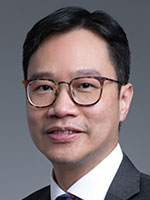Speakers

Prof. Chi-Wai CHEUNG
President, Hong Kong College of Anaesthesiologists, Hong Kong
Professor Cheung Chi Wai, MBBS(HK), MD(HKU), FHKCA, FFPMANZCA, FHKCA(Pain Med), FHKAM(Anaesthesiology), Dip Pain Mgt (HKCA) is currently the Clinical Professor of the Department of Anaesthesiology, The University of Hong Kong (HKU). He is also the Honorary Consultant of the Department of Anaesthesiology, Queen Mary Hospital, Grantham Hospital and Duchess of Kent Children’s Hospital, Hong Kong, as well as the Chief of Service, Department of Anaesthesiology, HKU-Shenzhen Hospital. Professor Cheung has published extensively in peer reviewed scientific journals in anaesthesiology and pain medicine. He is the editorial board member of British Journal of Anaesthesia and the Section Editor of Pain Practice. He is currently the President of Hong Kong College of Anaesthesiologists, and the Past President of the Society of Anaesthetists of Hong Kong.
Environmental Enrichment (EE) has been extensively studied pre-clinically, but whether the findings from these studies can be applied to pain management in patients is conflicting and unclear. The key features of EE: it is voluntary, cost-effective to implement, complementary to other existing therapies and uses multimodal techniques.
Use of EE in acute post-operative pain management with Enhanced Recovery After Surgery (ERAS) programs has been reviewed recently. EE has been used in post-operative patients with improvements in analgesia quality, reduction in analgesic use, less stress and better surgical recovery. This could be because the pleasanter recovery conditions provided by EE better addresses the psychosocial needs of the post-operative patient. EE may have an additive effect to the benefits provided by ERAS with further enhancement to patient recovery and quality of life. Studied EE interventions include virtual reality, mobile apps, educational materials, digital games, videos, aromatherapy and music. Of these, music has also been shown to improve patient satisfaction. Educational materials may improve quality of life and raise mood levels after surgery. Even sunlight has been identified as potentially reducing post-operative analgesic costs. EE is suggested to be further explored in managing surgical patients in view of its ease of implementation, safety and low cost.
Incorporation of EE into a standard pain management program is unlikely to be difficult or expensive. The potential benefits of reduced costs from EE due to shortening of the length of stay, less drug consumption and resulting lower drug adverse effects may drive the use of EE in clinical pain management. Clinically, combining EE with proposed and established clinical protocols or pathways in pain management (i.e. ERAS) may enable maximal benefits to be derived. Using multiple different EE activity modalities together in pain management may also further enhance its benefits and advantages.